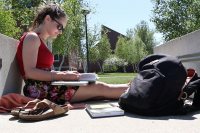
It’s that wonderful time of the year: Short Term 2012
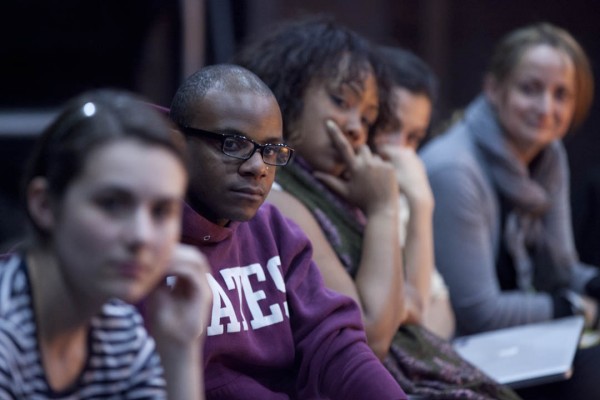
For Short Term 2012, the theater production workshop is adapting a spoken-word piece by Marc Bamuthi Joseph. Shown listening to Joseph are, from left, Katie Straw '12, Yasin Fairley '12, Ashley Booker '12, dance professor Rachel Boggia and theater lecturer Kati Vecsey. Photograph by Phyllis Graber Jensen/Bates College.
Short Term is so eagerly anticipated at Bates that it just might be fair to say that you are no Bobcat unless you spend the Maine winter yearning for it.
Short Term is the perfect storm — in a good way — of the Bates experience during the time of year when literal nor’easters finally become scarce. For five weeks in the spring, students are immersed in a single course chosen from a curriculum that blends rigorous, stimulating and exploratory content.
Even if they’re not taking a Short Term unit, many students also stay on campus to do substantial work in the community, conduct full-time research or complete the spring varsity season (commonly referred to as “Sport Term”).
At the same time, campus is abuzz with concerts, games and general undiluted fun. And there is no better month than May to be beckoned off-campus by Lewiston-Auburn delicacies like Dairy Joy and the Pop Shoppe Diner, or by the natural beauty of Maine at Range Pond or Old Orchard Beach.
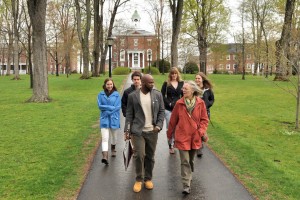
Writer-performer Marc Bamuthi Joseph, left, and Jane Costlow, Griffith Professor of Environmental Studies, lead a group of students in a perambulation as part of the Short Term course "Walking: The Practice, Politics, and Pleasures of One's Own Two Feet." Photograph by Hank Schless '14.
Short Term has come a long way from 1966, when it was implemented to enable students who so desired to finish their degree in three years instead of four. Today students must complete two Short Term units to graduate, though most take three, the maximum allowed.
Some professors use this time of year to delve into specific interests and passions, which results in classes that are engaging, experimental and just plain fun. Take, for instance, this year’s “Walking: The Practice, Politics, and Pleasures of One’s Own Two Feet,” taught by Jane Costlow, Griffith Professor of Environmental Studies.
Students will be asked to reflect on this mode of transportation through readings and interviews, and to practice it in urban and rural settings. Naturally, as the course description states, “the ability and willingness to walk in all weather is essential.”
Other eye-catching courses include “The Asteroid Impact Threat: What Can We Do?,” “Spy Games: The Role of Espionage in International Affairs” and “Microbes and Everyday Life.”
Short Term is also an unparalleled opportunity for community-based research. Several courses, like “Literacy in the Community” and “The Methodology of Coaching,” incorporate service-learning placements in Lewiston-Auburn; “Tour, Teach, Perform” puts Bates dancers into local schools to create choreography with students.
This year, too, the Harward Center for Community Partnerships is launching “Short Term Action/Research Team,” aka STA/RT, an intensive fellowship program in which students work on community-based research and research-based action initiatives.
Expanding the scope of community somewhat are courses investigating the uniqueness of Maine, such as “Wabanaki History in Maine,” a study of the state’s indigenous peoples and their contemporary presence; “Field Studies in Geology,” which, cross-listed in environmental studies, is taking students to locations around the state for a primer in geology and environmental studies fieldwork; and “Making African American History: Preserving the Archives of the Portland NAACP.”
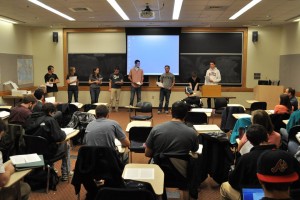
Students in the 2012 Short Term course "Introduction to Historical Methods," aka "History Hell," make a presentation to their classmates. Photograph by Hank Schless '14.
In the last, an independent study, students will help make accessible, for the first time, the records of the Portland chapter of the NAACP, founded in 1920. As they arrange and describe this documentary treasure trove, a collection of the Jean Byers Sampson Center for Diversity in Maine at the University of Southern Maine, Bates students will consider its considerable importance to the public record.
For some Batesies, Short Term is a ticket to fantastic locations beyond Maine’s borders. Students are exploring the mythical origins of Dracula, Romanian history and the narrative of travel in Transylvania itself during “Transylvanian Journey: Myth, Reality and the Traveler ‘Beyond the Forest.’ ”
Taking in lectures, experiencing everyday life and practicing basic ethnographic techniques, participants in “Contemporary Cuban Culture” are applying first-hand what they have previously studied about race, music, sexual identity and the post-Soviet Union “Special Period” in Cuban history.
And one off-campus course, “Saudi Arabia,” is happening because of the initiative and determination of a student: Leena Nasser ’12 of Dhahran, Saudi Arabia. The course, co-led by her and anthropology professor Loring Danforth, explores trends of modernization, the role of oil and economic development, Islam in Saudi culture and the role of women in Saudi society. Nasser has been so instrumental in planning this course that it’s likely to be a one-time offering.
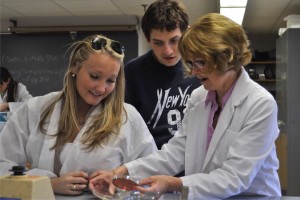
Maura Neal '12, Metehan Mete '12 and Lecturer in Biology Karen Palin examine bacterial samples gathered from around campus as part of Palin's Short Term course "Microbes and Everyday Life." Photograph by Phyllis Graber Jensen/Bates College.
Of course, Short Term comprises all kinds of academic adventures. For many departments, this is a valuable opportunity to immerse majors in rigorous courses that bolster their research capabilities and prepare them for conducting thesis during senior year. Hence “Political Inquiry,” “Building a Studio Practice,” “Introduction to Historical Methods” and “Introduction to Abstraction.”
Despite nicknames like “History Hell” (the methods course) and “Math Camp” (abstraction), these required courses build camaraderie among majors and hone needed skills. Some departments sweeten the deal with tangible rewards for extensive participation, like history hats and politics mugs.
As for “Political Inquiry,” professors Bill Corlett and Clarisa Perez-Armendariz have revamped their Short Term offering — but there’s no word yet if a catchy nickname is in store.

